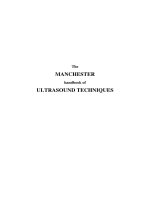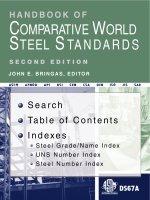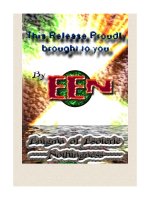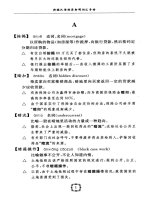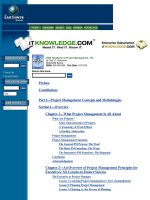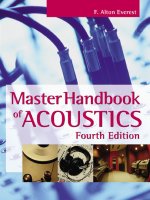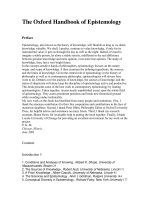The routledge handbook of world englishes routledge handbooks in applied linguistics
Bạn đang xem bản rút gọn của tài liệu. Xem và tải ngay bản đầy đủ của tài liệu tại đây (34.79 MB, 727 trang )
The Routledge Handbook of
World Englishes
The Routledge Handbook of World Englishes constitutes a comprehensive introduction
to the study of world Englishes, drawing on the expertise of leading authors within the
field.
The handbook is structured in six sections covering historical perspectives, core issues
and topics and new debates which together provide a thorough overview of the field,
taking into account the new directions in which the discipline is heading. Among the
key themes covered are the development of English as a lingua franca among speakers
for whom English is a common but not first language, the parallel development of
English as a medium of instruction in educational institutions throughout the world and
the role of English as the international language of scholarship and scholarly publishing, as well as the development of computer-mediated Englishes, including cyberprose.
The Handbook also includes a substantial introduction from the editor.
The Routledge Handbook of World Englishes is the ideal resource for postgraduate
students of applied linguistics as well as those in related degrees such as applied English
language and TESOL/TEFL.
Andy Kirkpatrick is Chair Professor of English as an International Language at the
Hong Kong Institute of Education.
Routledge Handbooks in Applied Linguistics
Routledge Handbooks in Applied Linguistics provide comprehensive overviews of the
key topics in applied linguistics. All entries for the handbooks are specially commissioned and written by leading scholars in the field. Clear, accessible and carefully
edited Routledge Handbooks in Applied Linguistics are the ideal resource for both
advanced undergraduates and postgraduate students.
The Routledge Handbook of Corpus Linguistics
Edited by Anne O’Keeffe and Michael McCarthy
The Routledge Handbook of Forensic Linguistics
Edited by Malcolm Coulthard and Alison Johnson
The Routledge Handbook of World Englishes
Edited by Andy Kirkpatrick
Forthcoming
The Routledge Handbook of Multilingualism
Edited by Marilyn Martin-Jones, Adrian Blackledge and Angela Creese
The Routledge Handbook of Applied Linguistics
Edited by James Simpson
The Routledge Handbook of Second Language Acquisition
Edited by Susan Gass and Alison Mackey
The Routledge Handbook of Discourse Analysis
Edited by James Paul Gee and Michael Handford
The Routledge Handbook of Translation Studies
Edited by Carmen Millan Varela and Francesca Bartrina
The Routledge Handbook of Language Testing
Edited by Glenn Fulcher and Fred Davidson
The Routledge Handbook of Intercultural Communication
Edited by Jane Jackson
The Routledge Handbook
of World Englishes
Edited by
Andy Kirkpatrick
First published 2010
by Routledge
2 Park Square, Milton Park, Abingdon, Oxon OX14 4RN
Simultaneously published in the USA and Canada
by Routledge
270 Madison Avenue, New York, NY 10016
Routledge is an imprint of the Taylor & Francis Group, an informa business
This edition published in the Taylor & Francis e-Library, 2010.
To purchase your own copy of this or any of Taylor & Francis or Routledge’s
collection of thousands of eBooks please go to www.eBookstore.tandf.co.uk.
© 2010 Selection and editorial matter, Andy Kirkpatrick; individual chapters,
the contributors
All rights reserved. No part of this book may be reprinted or reproduced or
utilised in any form or by any electronic, mechanical, or other means, now
known or hereafter invented, including photocopying and recording, or in any
information storage or retrieval system, without permission in writing from the
publishers.
British Library Cataloguing in Publication Data
A catalogue record for this book is available from the British Library
Library of Congress Cataloging in Publication Data
The Routledge handbook of world Englishes / edited by Andy Kirkpatrick.
p. cm. – (Routledge handbooks in applied linguistics)
Includes bibliographical references and index.
1. English language – Variation – English-speaking countries. 2. English
language – Variation – Foreign countries. 3. English language – Dialects.
I. Kirkpatrick, Andy.
PE1066.K53 2010
427 – dc22
2009051534
ISBN 0-203-84932-9 Master e-book ISBN
ISBN 978-0-415-47039-1 (hbk)
ISBN 978-0-203-84932-3 (ebk)
Contents
List
List
List
List
List
of
of
of
of
of
figures
maps
tables
contributors
abbreviations
Introduction
Andy Kirkpatrick
ix
x
xi
xiii
xx
1
Section I: Historical perspectives and ‘traditional’ Englishes
15
1
Standardized English: the history of the earlier circles
Daniel R. Davis
17
2
Grammatical variation in the contemporary spoken English of England
David Britain
37
3
Phonological innovation in contemporary spoken British English
Gerard J. Docherty
59
4
The Englishes of Ireland: emergence and transportation
Raymond Hickey
76
5
The development of Standard American English
William A. Kretzschmar, Jr
96
6
The Englishes of Canada
Stephen Levey
113
v
C O NT E N T S
7
English in Australia
Kate Burridge
132
8
The English(es) of New Zealand
Margaret Maclagan
152
Section II: Regional varieties and the ‘new’ Englishes
165
9
167
The development of the English language in India.
Joybrato Mukherjee
10 Sri Lankan Englishes
Dushyanthi Mendis and Harshana Rambukwella
181
11 East and West African Englishes: differences and commonalities
Hans-Georg Wolf
197
12 The development of English in Botswana: language policy and education
Birgit Smieja and Joyce T. Mathangwane
212
13 English in Singapore and Malaysia: differences and similarities
Low Ee Ling
229
14 Periphery ELT: the politics and practice of teaching English in the Philippines
Isabel Pefianco Martin
247
15 East Asian Englishes: Japan and Korea
Yuko Takeshita
265
16 Chinese English: a future power?
Xu Zhichang
282
17 Slavic Englishes: education or culture?
Zoya Proshina
299
18 West Indian Englishes: an introduction to literature written in selected
varieties
Hazel Simmons-McDonald
316
19 English and English teaching in Colombia: tensions and possibilities in the
expanding circle
Adriana González
332
Section III: Emerging trends and themes
353
20 Lingua franca English: the European context
Barbara Seidlhofer
355
vi
C ON T E N TS
21 Developmental patterns of English: similar or different?
Edgar W. Schneider
372
22 Variation across Englishes: phonology
David Deterding
385
23 Variation across Englishes: syntax
Bernd Kortmann
400
24 Mixed codes or varieties of English?
James McLellan
425
25 Semantics and pragmatic conceptualizations within an emerging variety:
Persian English
Farzad Sharifian
442
Section IV: Contemporary contexts and functions
459
26 In defence of foreignness
Ha Jin
461
27 Writing in English(es)
Tope Omoniyi
471
28 Online Englishes
Mark Warschauer, Rebecca Black and Yen-Lin Chou
490
29 The Englishes of business
Catherine Nickerson
506
30 Englishes in advertising
Azirah Hashim
520
31 The Englishes of popular cultures
Andrew Moody
535
32 ‘Thank you for calling’: Asian Englishes and ‘native-like’ performance in
Asian call centres
Kingsley Bolton
550
Section V: Debates and pedagogical implications
565
33 Which norms in everyday practice: and why?
T. Ruanni F. Tupas
567
34 Construing meaning in World Englishes
Ahmar Mahboob and Eszter Szenes
580
vii
C O NT E N T S
35 Which test of which English and why?
Brian Tomlinson
599
36 When does an unconventional form become an innovation?
David C.S. Li
617
37 Academic Englishes: a standardized knowledge?
Anna Mauranen, Carmen Pérez-Llantada and John M. Swales
634
38 Cameroon: which language, when and why?
Augustin Simo Bobda
653
Section VI: The future
671
39 The future of Englishes: one, many or none?
Alastair Pennycook
673
Index
viii
689
Figures
6.1 Schematization of the Canadian Shift
6.2 Comparison of the distribution of major quotative variants used by
Canadian youth, 1995 and 2002–3
6.3 Comparison of population by mother tongue (1996–2006)
8.1 NZE vowel plots in Hz for 10 males and 10 females, born between
1970 and 1980
15.1 Percentages of primary schools with English activities
15.2 Attitude to English at primary level
15.3 TOEFL scores 2004–5
15.4 Numbers of TOEFL takers
19.1 The pyramid of Colombian ELT policy
22.1 The monophthongs of the Singapore speaker
22.2 The monophthongs of the Nigerian speaker
22.3 The monophthongs of the Indian speaker
23.1 Visualization of principal components of variance in the 76 Â 46
WAMVE database
23.2 Transparency by grammaticity.
23.3 Analyticity by simplicity
28.1 The overall blogosphere
29.1 A categorization of BE interactions in global business
31.1 Horizontal and vertical flows in popular culture
34.1 Stratification and metafunction in SFL
37.1 A proposed space for interdiscursive hybridity in contemporary
academic English
38.1 Enrolment figures at the Cameroonian Bilingual Training Programme
from 1986 to 2006
116
122
126
156
270
270
271
271
346
388
390
391
411
413
414
496
513
543
585
644
658
ix
Maps
4.1
4.2
4.3
x
Ulster dialects
Ireland: dialect divisions
Spread of English from Ireland
79
82
84
Tables
1.1
1.2
4.1
5.1
7.1
7.2
7.3
10.1
11.1
11.2
11.3
11.4
11.5
11.6
11.7
12.1
12.2
12.3
12.4
13.1
13.2
13.3
14.1
14.2
14.3
14.4
14.5
14.6
15.1
Periodization of the history of the English language
The Great Vowel Shift
Summary of the Dublin Vowel Shift from the 1990s
American English vowels
Population of New South Wales based on 1828 census figures
Allophonic variation in five of the vowel phonemes of AusE
Percentage of [æ] in state capitals
Phrasal verbs in SLE
Contrastive features of EAE and WAE
Distinctive features of Cameroon English
Distinctive features of Nigerian English
Distinctive features of Ghanaian English
Distinctive features of Liberian English
Distinctive features of Sierra Leonean English
Distinctive features of Gambian English
Cross-border languages in Botswana
Knowledge of English by age of learning
General language distribution in selected domains in Botswana
English variety liked and understood best
Languages and dialects spoken by main ethnic groups in the Straits
Settlements
Languages spoken by the different ethnic groups
Phonemic vowel inventory of SgE and MalE
Elementary school enrolment 2007
High school enrolment 2007
Elementary school teachers 2007
High school teachers 2007
NAT elementary school results
NAT high school results
Number of participants in the JET Programme by country, 2008–9
18
30
83
107
133
136
138
189
202
203
203
204
205
206
207
214
218
220
222
230
235
239
248
248
248
248
249
249
272
xi
T A BL E S
15.2
16.1
16.2
22.1
22.2
22.3
22.4
23.1
23.2
23.3
24.1
30.1
30.2
30.3
30.4
30.5
30.6
34.1
34.2
34.3
34.4
35.1
35.2
38.1
38.2
xii
Korean students studying abroad by school level by year
Distribution of nominalized noun phrases in four articles in the ND data
‘Ancestral home town’ discourse of CE speakers
Tokens used in the measurement of the monophthongs
Rate of change for FACE and GOAT
Vowel quality in function words and the first syllable of concern
Rhythm measured using the PVI
WAMVE: distribution of 46 non-standard varieties across world regions
and variety types
Speech corpora and varieties of English investigated
Top candidates for morphosyntactic angloversals
Presence/absence of language alternation in corpus of 211 postings
Culture
Food
Forms of address
Events/celebrations
Raya advertisements
Deepavali/Diwali advertisements
The 3 x 3 matrix
Building field and logical relationships: Niloo
Building field and logical relationships (experiential meanings): Ashwini
Building field and logical relationships: Yasmina
ALTE ‘can do’ statements: overall general ability
Separate papers required for UCLES examinations
Adult enrolment for English and French in Cameroon by BTP centre
in 2007
Distribution of respondents by gender and language use at the
University of Buea
274
291
294
387
393
394
395
403
405
407
429
530
531
531
531
531
532
586
587
590
592
607
613
659
660
Contributors
Rebecca Black is an assistant professor of Language, Literacy, and Technology in the
Department of Education at the University of California, Irvine. She received her PhD
from the University of Wisconsin, Madison in 2006. Her research interests centre on
how youth, particularly English language learners, are using new technologies to learn,
create and communicate. Her publications include a recent book, Adolescents and
Online Fan Fiction.
Kingsley Bolton is Chair Professor of English and Head of the English Department at
the City University of Hong Kong. Professor Bolton was Elected President of the
International Association of World Englishes (IAWE) 2003–4. He is an editorial board
member of the journals English World-Wide, Journal of English Linguistics and
World Englishes, and co-editor of the Cambridge University Press journal English
Today.
David Britain is Professor of Modern English Linguistics at the University of Bern in
Switzerland, having previously worked in the Department of Linguistics at Victoria
University of Wellington in New Zealand (1991–3) and in the Department of Language
and Linguistics at the University of Essex in England (1993–2009). He has edited
Language in the British Isles (Cambridge University Press, 2007).
Kate Burridge is Professor of Linguistics at Monash University. Her main research interests are on grammatical change in Germanic languages, Pennsylvania German, linguistic
taboo and the structure and history of English. She is a regular presenter of language
segments on ABC radio and television.
Yen-Lin Chou is a PhD student in the Department of Education at the University of
California, Irvine, specializing in Language, Literacy and Technology. Her research
interests include discourse analysis, computer-mediated communication and second
language learning and teaching.
xiii
C O NT R I B U T OR S
Daniel R. Davis is Associate Professor of Linguistics at the University of MichiganDearborn. He studied linguistics and Celtic languages at Harvard and Oxford universities. His publications include The History of World Englishes: North America
(edited, 8 vols, 2003). He is editor of the journal World Englishes (Wiley-Blackwell)
and President of the International Association of World Englishes (IAWE).
David Deterding is an Associate Professor at the University of Brunei Darussalam. His
book Singapore English was published by Edinburgh University Press in 2007, and he
has papers on the pronunciation of various Englishes in a wide range of international
journals.
Gerard J. Docherty is Professor of Phonetics at Newcastle University in the north-east
of England. His research is focused on determining how the phonetic performance of
speakers is shaped by the various dimensions (physical, linguistic, cognitive and social)
of spoken communication, with a view to developing theories which account for
the systematic properties of speech in its social context. He has recently undertaken
a number of projects looking at the production and perception of sociophonetic
properties of speech across a number of varieties of English.
Adriana González holds a doctorate in linguistics (TESOL) from the State University
of New York at Stony Brook. She is an Associate Professor in the undergraduate and
graduate programs in foreign language teacher education at the School of Languages
of the Universidad de Antioquia in Medellín, Colombia. She is the current secretary
of the Colombian Association of English Teachers (ASOCOPI).
Ha Jin left China for the United States in 1985 and began to write in English after the
Tiananmen incident in 1989. To date he has published three volumes of poetry, four
books of short fiction, five novels and a book of essays, all in English. His works
have received several awards, including the National Book Award (1999) and the
PEN/Faulkner Award (2000 and 2005), and have been translated into more than
thirty languages. He teaches fiction writing and literature at Boston University.
Azirah Hashim is a Professor in the English Language Department, Faculty of Languages and Linguistics, University of Malaya. Her research interests include Language
and Law, Discourse of Advertising and English in Malaysia and in the Region.
Raymond Hickey studied for his MA in Trinity College, Dublin, and did his PhD at
Kiel, Germany, in 1980. He completed his second doctorate (German Habilitation)
in Bonn in 1985 and has held professorial appointments at four German universities
(Bonn, Munich, Bayreuth, Essen). His main research interests are computer corpus
processing, extraterritorial varieties of English (especially Irish English), Dublin
English and general questions of language contact, shift and change.
Andy Kirkpatrick is Chair Professor of English as an International Language at the Hong
Kong Institute of Education and Director of the Institute’s Research Centre into Language Education and Acquisition in Multilingual Societies (www.ied.edu.hk/rcleams).
His most recent book is English as a Lingua Franca in ASEAN: The Multilingual
Model, published (2010) by Hong Kong University Press.
xiv
C O N T RI BU T O RS
Bernd Kortmann is Full Professor of English Language and Linguistics at the University of Freiburg, Germany. His publications include four monographs, six edited
volumes, a two-volume handbook-cum-CD-ROM on the phonology and morphosyntax of the varieties of English around the world (2004), and about eighty articles
and reviews in journals and collective volumes. His main research interest over the
last decade has been the grammar of non-standard varieties of English around the world,
especially from a typological perspective.
William A. Kretzschmar, Jr. teaches English and Linguistics as Harry and Jane Willson Professor in Humanities at the University of Georgia. His major publications
include The Linguistics of Speech (Cambridge, 2009), and The Oxford Dictionary of
Pronunciation for Current English (Oxford, 2001) He is the editor of the American
Linguistic Atlas Project, the oldest and largest national research project to survey
how people speak differently in different parts of the country.
Stephen Levey is Assistant Professor of Linguistics at the University of Ottawa. His
research deals with variation in contemporary English, focusing on linguistic variability
in urban settings, as well as the language of children and adolescents.
David C.S. Li is Professor in the English Department of the Hong Kong Institute of
Education. His research interests are mainly related to the study of social aspects of
language learning and use in multilingual settings. He has published in three main areas:
World Englishes and perceptions of ‘Hongkong English’, code-switching in Hong
Kong and Taiwan, and EFL learners’ difficulties and error-correction strategies.
Low Ee Ling is concurrently Associate Professor at the English Language and Literature Academic Group and Associate Dean of Programme and Student Development
at the National Institute of Education, Singapore. Her research interests are in
acoustic phonetics and features-based studies on world varieties of English, English
language teacher education and teacher education in general.
Margaret Maclagan is Associate Professor of Communication Disorders at the University of Canterbury. Her research interests include sound change over time in New
Zealand English and the Maori language. She is a member of the Origins of New
Zealand English (ONZE) and Maori and New Zealand English (MAONZE) research
groups.
James McLellan is a Lecturer in Sociolinguistics and Applied Linguistics at the University
of Waikato, Hamilton, Aotearoa (New Zealand). He previously taught at secondary
and tertiary levels in Malaysia (1978–84) and in Brunei Darussalam (1986–2002). His
research interests include Malay–English codeswitching, language maintenance and shift
in Borneo, language policy in education and Southeast Asian varieties of English.
Ahmar Mahboob is a Senior Lecturer in the Department of Linguistics at the University of
Sydney. His research interests include educational linguistics, teacher education,
minority languages (in South Asia), language policy development, NNEST studies,
pidgin and creole languages, pragmatics and World Englishes. He is the co-editor of
Questioning Linguistics (2008) with Naomi Knight; Studies in Applied Linguistics
xv
C O NT R I B U T OR S
and Language Learning (2009) with Caroline Lipovsky; Appliable Linguistics: Texts,
Contexts, and Meanings (in press for 2010) with Naomi Knight.
Isabel Pefianco Martin is Associate Professor and Coordinator for Research at the School
of Humanities, Ateneo de Manila University. She was Chair of the English Department
from 1998 to 2004, President of the Linguistic Society of the Philippines (LSP) from
2006 to 2008, and Secretary of the American Studies Association of the Philippines
(ASAP) in 2006.
Joyce T. Mathangwane is an Associate Professor of Language and Linguistics in the
Department of English, University of Botswana. She has published widely in the
areas of Bantu phonology and morphology, sociolinguistics, comparative linguistics
and onomastics.
Anna Mauranen is Professor of English at the University of Helsinki. Her current major
research interests are English as a lingua franca, corpus linguistics and modelling spoken
language. Her publications focus on spoken language, corpus linguistics, contrastive
rhetoric, translation and academic discourses. She is Director of the ELFA project,
which has compiled a 1-million word corpus of academic ELF (the ELFA corpus).
Dushyanthi Mendis is a Senior Lecturer at the Department of English, University of
Colombo, Sri Lanka. She has a PhD in Linguistics from the University of Michigan, Ann
Arbor, and her research interests are sociolinguistics, corpus linguistics and discourse analysis. She is currently involved in compiling the International Corpus of
English – Sri Lanka (ICE-SL), in collaboration with the University of Giessen, Germany.
Andrew Moody is an Associate Professor of Linguistics in the English Department at
the University of Macau, where he teaches sociolinguistics at both the undergraduate
and graduate levels. His research interests include the development of varieties of
World Englishes and the role of English in popular culture, especially within Asia.
Currently he is editing, together with Jamie Shinhee Lee, a collection of essays for
Hong Kong University Press entitled English in Asian Pop Culture.
Joybrato Mukherjee is Full Professor of English Linguistics at Justus Liebig University, Giessen (Germany). His research interests include applied linguistics and corpus
linguistics, English lexico-grammar and syntax, South Asian varieties of English and
English as a world language.
Catherine Nickerson is an Associate Professor at Zayed University in the United Arab
Emirates. She has lived in India, the United States, the Netherlands and the United
Kingdom. She has been teaching and researching the use of English as an international
business language for the past fifteen years.
Tope Omoniyi is the Chair of Sociolinguistics in the School of Arts, Roehampton
University, in London. He is also a poet and the author of Farting Presidents and
Other Poems (Kraft Books, 2001). His poems have also appeared in journals in
Nigeria (ANA Review), Singapore (AWARE), Malaysia (Tenggara and The Gombak
Review), USA (Quill Books and Anthropology and Humanism), UK (The Unruly Sun),
xvi
C O N T RI BU T O RS
seven Forward Press anthologies, and in Sweden (Nordic African Institute Newsletter).
In 1985, he won a runner-up prize in the National Anti-Apartheid Poetry Competition in Nigeria and in 2001 he received a honourable mention in the Anthropology
and Humanism Annual Poetry Competition. The poems published in African Writing
On-line are from a yet-to-be published collection titled Word-o-graphs, a series of
pictures in verse form of the poet’s response to some of the places he has been.
Alastair Pennycook is Professor of Language Studies at the University of Technology
Sydney. He is interested in how we understand language in relation to globalization,
colonial history, identity, popular culture and pedagogy. His many publications include
Critical Applied Linguistics: A Critical Introduction (Lawrence Erlbaum, 2001) and
Global Englishes and Transcultural Flows (Routledge, 2007). His new book Language
as a Local Practice (Routledge) is due for publication in 2010.
Carmen Pérez-Llantada is a Senior Lecturer of English at the University of Zaragoza,
Spain. She is interested in genre-based, pragmatic and rhetorical analyses of academic
speech and writing. With G.R. Ferguson (University of Sheffield), she co-edited
English as a GloCalisation Phenomenon: Observations from a Linguistic Microcosm
(2006).
Zoya Proshina is currently Professor in Department of Theory of FLT, School of Foreign Languages and Area Studies, Lomonosov Moscow State University (Moscow,
Russia), where she teaches EFL, the WE paradigm, cross-cultural communication,
translation and interpretation theory and practice. She is currently President (2010–12)
of the International Association of World Englishes.
Harshana Rambukwella completed his PhD on representations of nationalism in Sri
Lankan writing at the University of Hong Kong in 2008. He is now Honorary Assistant Professor at the School of English, University of Hong Kong. Harshana’s research
interests are postcolonial literatures in English and the role of historical narratives in
community and national identity formation.
Edgar W. Schneider holds the Chair of English Linguistics at the University of Regensburg, Germany. He has written and edited several books and published widely on the
dialectology, sociolinguistics, history, semantics and world-wide varieties of English.
He edits the scholarly journal English World-Wide and an associated book series.
Barbara Seidlhofer is Professor of English and Applied Linguistics at the University of
Vienna, Austria. She is the founding director of the Vienna–Oxford International Corpus
of English (VOICE).
Farzad Sharifian is an Associate Professor and the Director of the Language and
Society Centre within the School of Languages, Cultures and Linguistics, Monash
University, Australia. He is also the Convenor of the academic program of English
as an International Language at Monash University. He has a wide range of research
interests including cultural linguistics, pragmatics, English as an International Language,
World Englishes, language and politics, and intercultural communication. He is the
editor of English as an International Language (2009, Multilingual Matters).
xvii
C O NT R I B U T OR S
Hazel Simmons-McDonald is Pro-Vice Chancellor and Principal of the Open Campus of
the University of the West Indies, a post she has held from 2007. She is Professor of
Applied Linguistics and her primary research interests are second language acquisition and literacy development in creole contexts. She served for several years as the
Secretary-Treasurer of the Society for Caribbean Linguistics, as Vice President for
one year, and as President in 2008–9.
Augustin Simo Bobda holds several academic and professional qualifications from
Cameroon, Great Britain and America. He is Professor of English Language and
Linguistics and Head of the Department of English at the Higher Teaching Training
College (Ecole Normale Supérieure) of the University of Yaounde I. He is the author
of over seventy journal articles, book chapters, edited volumes, textbooks and monographs on various aspects of English language, linguistics, sociolinguistics and applied
linguistics.
Birgit Smieja is a lecturer at the University of Koblenz-Landau in the Department of
English, teaching English to students aiming at becoming teachers for primary school.
She has published and co-authored several books in the area of sociolinguistics with
a focus on Africa.
John M. Swales is Professor Emeritus of Linguistics at the University of Michigan, where
he was also Director of the English Language Institute from 1985 to 2001. Books
that appeared in 2009 include two small textbooks (with Chris Feak) on aspects of
advanced academic literacy (Abstracts and the Writing of Abstracts and Telling a
Research Story) and Incidents in an Educational Life: A Memoir (Of Sorts), all
published by the University of Michigan Press.
Eszter Szenes is a PhD candidate in the Department of Linguistics at the University of
Sydney. She graduated as a Master of Arts in English Language and Literature and
TESOL in 2005 in Budapest, Hungary. Her research interests include Systemic Functional Linguistics, academic literacy, World Englishes, NNEST studies and Critical
Applied Linguistics.
Yuko Takeshita is Professor in the Faculty of Social Sciences, Toyo Eiwa University.
As a founding member and a board member of the Japanese Association for Asian
Englishes, she has focused on intercultural communication between Thai and Japanese people. She has been an editor of Asian Englishes, has worked as a researcher
for the Education Ministry and as the director of a municipal Board of Education.
Brian Tomlinson is a Visiting Professor at Leeds Metropolitan University and the Founder
and President of MATSDA (the international Materials Development Association).
He has worked in Indonesia, Japan, Nigeria, Oman, Singapore, Vanuatu and Zambia
and has published numerous books and articles on materials development for language learning, on language through literature, on language awareness and on English as an international language.
T. Ruanni F. Tupas is Senior Lecturer, Centre for English Language Communication
(CELC), National University of Singapore (NUS). He is the 2009 recipient of the
xviii
C O N T RI BU T O RS
Andrew Gonzalez Distinguished Professorial Chair in Linguistics and Language
Education awarded by the Linguistic Society of the Philippines, and a 2008 National
Book Award Finalist for the edited volume (Re)Making Society: The Politics of
Language, Discourse and Identity in the Philippines (University of the Philippines
Press, 2007).
Mark Warschauer is Professor of Education and Informatics at the University of
California, Irvine, and director of the Digital Learning Lab at the university. He also
directs the university’s PhD in Education program, which includes a specialization in
Language, Literacy and Technology. His books include Laptops and Literacy: Learning
in the Wireless Classroom (Teachers College Press, 2006); Technology and Social
Inclusion: Rethinking the Digital Divide (MIT Press, 2004).
Hans-Georg Wolf is Associate Professor in the School of English at the University of
Hong Kong, and currently also holds the Chair for Development and Variation of the
English Language at the University of Potsdam. His research interests include sociolinguistics (in particular World Englishes), cognitive linguistics and intercultural
pragmatics.
Xu Zhichang is Assistant Professor in the English Department of the Hong Kong Institute
of Education. His current research interests include teaching English in multilingual
settings, Chinese English (CE) studies, language and cross-cultural education, blended
learning and teaching, developing academic literacy, and teacher training. He is currently
working on Chinese English: Features and Implications for the Open University of
Hong Kong Press.
xix
Abbreviations
1s
1pi
1pe
3s
3p
<
>
*
AAVE
AbE
ABBR
AppE
AusCs
AusVE
AV
BahE
BelC
BlSAfE
ButlE
CamE
CamP
ChcE
CollAmE
CollAusE
CollBrE
DEM
DM
EAfE
FijE
FUT
xx
first-person singular pronoun
first-person plural inclusive pronoun
first-person plural exclusive pronoun
third-person singular pronoun
third-person plural pronoun
comes from
becomes
reconstructed or unattested form
African American Vernacular English
(Australian) Aboriginal English
abbreviation
Appalachian English
Australian Creoles
Australian Vernacular English
active verb
Bahamian English
Belizean Creole
Black South African English
Butler English (India)
Cameroon English
Cameroon Pidgin
Chicano English
Colloquial American English
Colloquial Australian English
Colloquial British English
demonstrative
discourse particle/marker
East African English
Fiji English
future
A B B RE V I A T I O NS
GhE
GhP
Gmc
HawC
HKE
IMP
INT
IndE
InSAfE
IrE
IsSE US
JamC
JamE
Lat
MalE
Mid
Nfk
NfldE
NigP
NIrE
NZE
OzE
PakE
PASS
PhilE
POSS
RDP
REL
ScE
SgE
ScH
SolP
SurC
Tob/TrnC
TP
WelE
WhSAfE
N
EA
SW
SE
Ghanaian English
Ghanaian Pidgin
Germanic
Hawaii Creole
Hong Kong English
imperative
interrogative particle/marker
Indian English
Indian South African English
Irish English
South Eastern American English enclave dialects
Jamaican Creole
Jamaican English
Latin
Malaysian English
English Midlands
Norfolk
Newfoundland English
Nigerian Pidgin
Northern Irish English
New Zealand English
Ozarks English
Pakistani English
passive
Philippines English
possessive
reduplication
relative
Scottish English
Singapore English
Scottish Highlands
Solomon Islands Pidgin
Suriname Creoles
Tobagonian/Trinidadian Creole
Tok Pisin, New Guinea Pidgin, Neomelanesian
Welsh English
White South African English
North
East Anglia
Southwest
Southeast
xxi
Introduction
Andy Kirkpatrick
It is commonly accepted that there are now many more people who speak English as a
second or later language than there are native speakers of it. In China alone, some
estimate that there are as many learners of English (some 350 million) as there are
native speakers of it (Xu, this volume). This means that the great majority of the
world’s English users are multilinguals. As Graddol (2006: 114) has pointed out, this
extraordinary increase in the number of English speakers in today’s world means that
the position and prestige previously associated with being a native speaker of English is
becoming questioned. Furthermore, the monolingual speaker of English is likely to be
at a considerable disadvantage in today’s multilingual world, especially when so many
of the multilinguals have English as one of their languages.
The spread of English – where ‘spread implies adaptation and non-conformity’
(Widdowson 1997: 140) – has seen the development of many different varieties of
English. Many of these newer varieties of English developed in places which were
colonized by English-speaking colonizers, primarily from Great Britain, but also from
the United States of America, as was the case in the Philippines, for example. New
varieties developed in these countries and some of these later became institutionalized.
Thus we can now talk about the different varieties of English across many parts of the
world, including many African countries, in the subcontinent, across Asia and in the
Caribbean. We can also talk about the different varieties of English which exist within
each country where English has become institutionalized.
Varieties of English are not restricted to these postcolonial settings, of course. There
remains an extraordinary range of varieties and variation within the traditional homes of
English. Great Britain is host to a large number of distinctive vernaculars of English, from
Doric in the north east of Scotland to West Country in Devon and Cornwall. The United
States is also home to a wide range of English vernaculars, as are the other ‘settlement’
colonies (Mufwene 2001) such as Australia and New Zealand, where local varieties of
English spoken by Australian Aborigines and New Zealand Maori add to the mix.
Kachru, the scholar who could be called the founding father of World Englishes as a
discipline, classified the various types of Englishes using a circles analogy (Kachru
1992). This classification is adopted or discussed by a number of contributors to this
1
ANDY KIRKPATRICK
volume, and Schneider (Chapter 21) gives a useful summary. Kachru called the Englishes of Great Britain, the United States and settlement colonies in general, ‘inner
circle’ varieties. The new Englishes that developed in these settlement colonies depended more on the speech of the settlers themselves, although the speech and languages
of the indigenous inhabitants naturally had – and continue to have – some influence.
The Englishes which developed in the trade or exploitation colonies, such as those in
Africa and Asia, were naturally more influenced by the languages of the indigenous peoples, simply because there was much more contact between the colonizers and the locals
and because the locals usually represented the overwhelming majority of the population.
Kachru classified these Englishes as ‘outer circle’ varieties. The third ‘circle’ of Englishes which Kachru identified belonged to the ‘expanding circle’. These were found in
countries where English was traditionally learned as a foreign language and in which
English played little or no administrative or institutional role. As Kachru himself has
pointed out, however, it is in these expanding circle countries where the development
of English has been most pronounced in recent years. For example, as China’s economic and political influence spreads, so has the role of English increased in importance
for many educated Chinese within China. As argued by several contributors to this
Handbook, it seems likely that new varieties of English will develop in at least some of
the countries which were classified as belonging to the expanding circle.
In addition to these regional varieties of English, there is also a range of Englishes
whose roles and features are determined by their function. These include, for example,
the Englishes of businesses and computer-mediated Englishes. They include the Englishes of academia and of pop culture. And, as Pennycook reminds us in the final
chapter of this Handbook, we are also seeing the emergence of ‘translingua franca
English’ whereby ‘new’ English speakers draw on linguistic resources which are not
determined by national boundaries.
The very number of different varieties of English – both ‘traditional’ and ‘new’ – coupled
with the extraordinary increase in the use of English as the international lingua franca
among English-speaking multilinguals, means that the publication of this Handbook of
World Englishes is timely. The Handbook aims to provide the general reader and student
with an overview of recent developments and debates in this rapidly expanding field. It
should be stressed, however, that no Handbook of World Englishes could ever be complete.
There are simply too many Englishes and varieties of these to be covered in a single volume.
Instead, this Handbook will provide an overview and description of a selected number of
Englishes, regional, national, functional and international, along with a review of recent
trends, debates and the implications of these new developments for the future of English.
The Handbook is divided into six sections, namely ‘Historical perspectives and traditional Englishes’, ‘Regional varieties and the “New” Englishes’, ‘Emerging trends and
themes’, ‘Contemporary contexts and functions’, ‘Debates and pedagogical implications’
and ‘The future’.
Section I: Historical perspectives and traditional Englishes
Section I comprises eight chapters. In ‘Standardized English: the history of the earlier
circles’, Daniel Davis presents a richly illustrated historical survey of the major effects
of linguistic change on the standardized forms of English and shows that the standardized forms of inner circle Englishes are themselves hybrid forms. In this sense,
2

